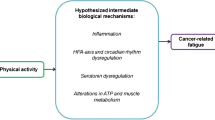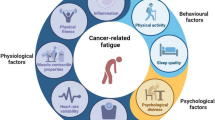Abstract
CRF is the most frequently reported symptom affecting up to 90% of cancer patients. CRF is distinguishable from normal tiredness in that CRF symptoms are severe, distressing, and are not relieved by rest or sleep. While the mechanisms and contributing factors that lead to CRF are unclear, good evidence exists for promoting exercise as an intervention to combat CRF. Currently, more than 20 RCTs have examined the effects of exercise on CRF scores. Despite methodological limitations and small sample sizes, the evidence suggests that exercise can improve CRF both during and after cancer treatments. Current guidelines for exercise prescription in this population recommend a progressive aerobic exercise program of 20–30 min.session–1, 3–5 days.week–1 at a moderate intensity of 60–80% of MHR. Further research is needed that examines potential mechanisms by which exercise influences symptoms of CRF.
Access this chapter
Tax calculation will be finalised at checkout
Purchases are for personal use only
Similar content being viewed by others
References
Radbruch L, Strasser F, Elsner F, Goncalves JF, Loge J, Kaasa S, et al. (2008) Fatigue in palliative care patients – an EAPC approach. Palliative Med 22:13–32.
Stone PC, Minton O. (2008) Cancer-related fatigue. Eur J Cancer44:1097–1104.
NCCN. (2008) National Comprehensive Cancer Network Clinical Practice Guidelines in Oncology: cancer related fatigue. Available from: http://www.nccn.org. Accessed 17 August 2008.
Hofman M, Ryan JL, Figueroa-Moseley CD, Jean-Pierre P, Morrow GR. (2007) Cancer-related fatigue: the scale of the problem. Oncologist 12:4–10.
Stevinson C, Lawlor DA, Fox KA. (2004) Exercise interventions for cancer patients: systematic review of controlled trials. Cancer Cause Control 15:1035–1056.
Knols R, Aaronson NK, Duebelhart D, Fransen J, Aufdemkampe G. (2005) Physical exercise in cancer patients during and after medical treatment: a systematic review of randomized and controlled trials. J Clin Oncol 23:3830–3841.
Schmitz KH, Holtzman J, Courneya KS, Masse LC, Duval S, Kane R. (2005) Controlled physical activity trials in cancer survivors: a systematic review and meta-analysis. Cancer Epidem Biomar Prev 14:1588–1595.
Hjermstad MJ, Fayers PM, Bjordal K, Kaasa S. (1998) Using reference data on quality of life – the importance of adjusting for age and gender, exemplified by the EORTC QLQ-C30 (+3). Eur J Cancer 34:1381–1389.
Prue G, Rankin J, Allen J, Gracey J, Cramp F. (2006) Cancer-related fatigue: a critical appraisal. Eur J Cancer 42:846–863.
Meeske K, Smith AW, Alfano CM, McGregor BA, McTiernan A, Baumgartner KB, et al. (2007) Fatigue in breast cancer survivors two to five years post diagnosis: a HEAL study report. Qual Life Res 16:947–960.
Servaes P, Gielissen MF, Verhagen S, Bleijenberg G. (2007) The course of severe fatigue in disease-free breast cancer patients: a longitudinal study. Psycho Oncol 16:787–795.
Hjermstad MJ, Fossa SD, Oldervoll L, Holte H, Jacobsen AB, Loge JH. (2005) Fatigue in long-term Hodgkin’s disease survivors: a follow-up study. J Clin Oncol 23:6587–6595.
Mock V, St Ours C, Hall S, Bositis A, Tillery M, Belcher A, et al. (2007) Using a conceptual model in nursing research – mitigating fatigue in cancer patients. J Adv Nurs 58:503–512.
Ruckdeschel JC. (2005) Fatigue is becoming an exhausting problem. Cancer 103:213–215.
Bruera E. (2007) Managing cancer-related symptoms: advances in supportive oncology. Clin Adv Hematol Oncol 5:29–31.
Jacobsen PB, Donovan KA, Vadaparampil ST, Small BJ. (2007) Systematic review and meta-analysis of psychological and activity-based interventions for cancer-related fatigue. Health Psychol 26:660–667.
Ahlberg K, Ekman T, Gaston-Johansson F, Mock V. (2003) Assessment and management of cancer-related fatigue in adults. Lancet 362:640–650.
Boohene JA, Bruera E. (2006) Treatment of fatigue in palliative care. In: Bruera E, et al. (eds) Textbook of Palliative Medicine. Hodder Arnold, New York, pp 639–672.
Evans WJ, Lambert CP. (2007) Physiological basis of fatigue. Am J Phys Med Rehabil 86:S29–S46.
Mock V, Atkinson A, Barsevick AM, Berger AM, Cimprich B, Eisenberger MA, et al. (2007) Cancer-related fatigue: clinical practice guidelines in oncology. J Natl Compr Cancer Netw 5:1054–1078.
Loge J. (2006) Assessment of fatigue in palliative care. In: Bruera E, et al. (eds) Textbook of Palliative Med. Hodder Arnold, New York, pp. 613–620.
Cella D, Peterman A, Passik S, Jacobsen P, Breitbart W. (1998) Progress toward guidelines for the management of fatigue. Oncology (Williston Park) 12:369–377.
Minton O, Stone P. (2009) A systematic review of scales used for the measurement of cancer-related fatigue. Ann Oncol 20:27–33.
Stone P. (2002) The measurement, causes and effective management of cancer-related fatigue. Int J Palliative Nurs 8:120–128.
Cella D, Davis K, Breitbart W, Curt G. (2001) Cancer-related fatigue: prevalence of proposed diagnostic criteria in a united states sample of cancer survivors. J Clin Oncol 19:3385–3391.
Minton O, Richardson A, Sharpe M, Hotopf M, Stone P. (2008) A systematic review and meta-analysis of the pharmacological treatment of cancer-related fatigue. J Natl Cancer Inst 100:1155–1166.
Bohlius J, Weingart O, Trelle S, Engert A. (2006) Cancer-related anemia and recombinant human erythropoietin – an updated Overview. Nat Clin Pract Oncol 3:152–164.
Bennett CL, Silver SM, Djulbegovic B, Samaras AT, Blau CA, Gleason KJ, et al. (2008) Venous thromboembolism and mortality associated with recombinant erythropoietin and darbepoetin administration for the treatment of cancer-associated anemia. J Am Med Assoc 299:914–924.
Jim HSL, Jacobsen PB. (2008) Assessment and management of cancer-related fatigue. In: Lyman GH, Crawford J (eds) Cancer Supportive Care. Informa Healthcare, New York, pp 13–29.
Luebbert K, Dahme B, Hasenbring M. (2001) The effectiveness of relaxation training in reducing treatment-related symptoms and improving emotional adjustment in acute non-surgical cancer treatment: a meta-analytical review. Psycho Oncol 10:490–502.
McNeely ML, Campbell KL, Rowe BH, Klassen TP, Mackey JR, Courneya KS, et al. (2006) Effects of exercise on breast cancer patients and survivors: a systematic review and meta-analysis. CMAJ 175:34–41.
Oldervoll LM, Kaasa S, Hjermstad MJ, Lund JA, Loge JH. (2004) Physical exercise results in the improved subjective well-being of a few or is effective rehabilitation for all cancer patients?. Eur J Cancer 40:951–962.
Cramp F, Daniel J. (2008). Exercise for the management of cancer-related fatigue in adults. Cochrane Database Syst Rev (2):CD006145.
Markes M, Brockow T, Resch KL. (2006). Exercise for women receiving adjuvant therapy for breast cancer. Cochrane Database Syst Rev (4):CD005001.
McNeely ML, Peddle CJ, Parliament M, Courneya KS. (2006) Cancer rehabilitation: recommendations for integrating exercise programming in the clinical practice setting. Curr Cancer Therapy Rev 2:351–360.
Thorsen L, Courneya KS, Stevinson C, Fossa SD. (2008) A systematic review of physical activity in prostate cancer survivors: outcomes, prevalence, and determinants. Supp Care Cancer16:987–997.
Segal RJ, Reid RD, Courneya KS, Malone SC, Parliament MB, Scott CG, et al. (2003) Resistance exercise in men receiving androgen deprivation therapy for prostate cancer. J Clin Oncol 21:1653–1659.
Segal RJ, Reid RD, Courneya KS, Sigal RJ, Kenny GP, Prud’Homme DG, et al. (2009) Randomized controlled trial of resistance or aerobic exercise in men receiving radiation therapy for prostate cancer. J Clin Oncol 27:344–351.
Wiskemann J, Huber G. (2008) Physical exercise as adjuvant therapy for patients undergoing hematopoietic stem cell transplantation. Bone Marrow Transpl 41:321–329.
Wilson RW, Jacobsen PB, Fields KK. (2005) Pilot study of a home-based aerobic exercise program for sedentary cancer survivors treated with hematopoietic stem cell transplantation. Bone Marrow Transpl 35:721–727.
Carlson LE, Smith D, Russell J, Fibich C, Whittaker T. (2006) Individualized exercise program for the treatment of severe fatigue in patients after allogeneic hematopoietic stem-cell transplant: a pilot study. Bone Marrow Transpl 37:945–954.
Dimeo FC, Stieglitz RD, Novelli-Fischer U, Fetscher S, Keul J. (1999) Effects of physical activity on the fatigue and psychologic status of cancer patients during chemotherapy. Cancer 85:2273–2277.
Coleman EA, Coon S, Hall-Barrow J, Richards K, Gaylor D, Stewart B. (2003) Feasibility of exercise during treatment for multiple myeloma. Cancer Nurs 26:410–419.
Lowe SS, Watanabe SM, Courneya KS. (2009) Physical activity as a supportive care intervention in palliative cancer patients: a systematic review. J Supp Oncol 7: 27–34.
Oldervoll LM, Loge JH, Paltiel H, Asp MB, Vidvei U, Wiken AN, et al. (2006) The effect of a physical exercise program in palliative care: a phase II study. J Pain Symptom Manag 31:421–430.
Headley JA, Ownby KK, John LD. (2004) The effect of seated exercise on fatigue and quality of life in women with advanced breast cancer. Oncol Nurs Forum31:977–983.
Courneya KS, Friedenreich CM, Sela RA, Quinney HA, Rhodes RE, Handman M. (2003) The group psychotherapy and home-based physical exercise (group-hope) trial in cancer survivors: physical fitness and quality of life outcomes. Psycho Oncol 12:357–374.
Heim ME, v d Malsburg ML, Niklas A. (2007) Randomized controlled trial of a structured training program in breast cancer patients with tumor-related chronic fatigue. Onkologie 30:429–434.
Courneya KS, Jones LW, Peddle CJ, Sellar CM, Reiman T, Joy AA, et al. (2008) Effects of aerobic exercise training in anemic cancer patients receiving darbepoetin alfa: a randomized controlled trial. Oncologist13:1012–1020.
Courneya KS, Mackey JR, Rhodes RE. (2004) Cancer. In: Lemura LM, von Duvillard, SP (eds) Clinical Exercise Physiology. Lippincott Williams & Wilkins, Philadelphia, pp 387–404.
Lane K, McKenzie DC. (2005) Cancer. In: Skinner JS (ed) Exercise Testing and Exercise Prescription for Special Cases. Lippincott Williams & Wilkins, Baltimore, pp 363–376.
ACSM (2006) ACSM’s guidelines for exercise testing and prescription, 7th ed. ed. Whaley MH, Brubaker PH (eds), Lippincott Williams & Wilkins, Baltimore.
Finch E, Brooks D, Stratford PW, Mayo NE. (2002) Physical Rehabilitation Outcome Measures, 2nd ed. BC Decker, Hamilton, pp. 1–292.
Rikli RE, Jones CJ. (2001) Senior Fitness Test Manual. Human Kinetics, Champaign, p 161.
Cress ME, Petrella JK, Moore TL, Schenkman ML. (2005) Continuous-scale physical functional performance test: validity, reliability, and sensitivity of data for the short version. Phys Ther 85:323–335.
McKelvie RS. (2005) Heart failure. In: Skinner JS (ed) Exercise Testing and Exercise Prescription For Special Cases. Lippincott Williams & Wilkins, Baltimore, pp 323–336.
MacVicar MG, Winningham ML. (1986) Promoting the functional capacity of cancer patients. Cancer Bull 38:235–239.
Mock V, Burke MB, Sheehan P, Creaton EM, Winningham ML, McKenney-Tedder S, et al. (1994) A nursing rehabilitation program for women with breast cancer receiving adjuvant chemotherapy. Oncol Nurs Forum 21:899–907.
McArdle WD, Katch FI, Katch VL. (2001) Exercise Physiology, 5th ed. Lippincott Williams & Wilkins, Baltimore, p 1158.
Bennett K. (2005) Therapeutic exercise for arthritis. In: Hall CM, Brody LT (eds) Therapeutic Exercise: Moving Towards Function. Lippincott Williams & Wilkins, Baltimore, pp 229–241.
Acknowledgment
Kerry S. Courneya, Ph.D., is supported by the Canada Research Chairs Program and Research Team Grant from the NCI of Canada with funds from the Canadian Cancer Society and the Sociobehavioral Cancer Research Network.
Author information
Authors and Affiliations
Corresponding author
Editor information
Editors and Affiliations
Rights and permissions
Copyright information
© 2010 Springer Science+Business Media, LLC
About this chapter
Cite this chapter
McNeely, M.L., Courneya, K.S. (2010). Exercise and Cancer-Related Fatigue Syndrome. In: Saxton, J., Daley, A. (eds) Exercise and Cancer Survivorship. Springer, New York, NY. https://doi.org/10.1007/978-1-4419-1173-5_2
Download citation
DOI: https://doi.org/10.1007/978-1-4419-1173-5_2
Published:
Publisher Name: Springer, New York, NY
Print ISBN: 978-1-4419-1172-8
Online ISBN: 978-1-4419-1173-5
eBook Packages: Biomedical and Life SciencesBiomedical and Life Sciences (R0)




